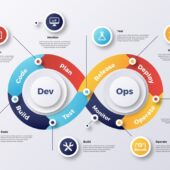In today’s fast-paced digital world, artificial intelligence (AI) continues to shape how businesses operate. A major breakthrough in AI technology is the emergence of Large Language Models (LLMs). But what exactly is an LLM, and how can it boost your business to new heights? In this article, we’ll break down the key aspects of LLMs and their transformative role in modern enterprises.
Introduction to Large Language Models (LLMs)
What is an LLM?
A Large Language Model (LLM) is a type of artificial intelligence algorithm that can understand, generate, and interpret human language at an unprecedented level. By leveraging massive datasets and advanced machine learning techniques, LLMs like OpenAI’s GPT series are designed to mimic human-like language processing, making them incredibly useful in a variety of applications, from content creation to customer service.
Why are LLMs making waves in technology?
The power of LLMs lies in their ability to handle vast amounts of data and produce highly coherent, context-aware responses. With the rise of digital communications and data-driven decision-making, businesses are increasingly turning to LLMs to streamline operations, improve customer interactions, and unlock valuable insights from data.
The Core Functionality of LLMs
How do Large Language Models work?
LLMs operate by using neural networks, which mimic the human brain’s ability to learn patterns. They are trained on vast amounts of text data, allowing them to understand context, syntax, and even nuance. LLMs can predict what comes next in a sentence, generate text based on prompts, and even engage in deep, meaningful conversations.
Machine learning and natural language processing
Machine learning (ML) and natural language processing (NLP) are the backbones of LLM technology. ML enables the models to improve over time, learning from data, while NLP allows LLMs to process and generate human language. The result? A system that can assist businesses in automating tasks and making more informed decisions.
Types of Large Language Models
OpenAI GPT series
The GPT (Generative Pre-trained Transformer) models, particularly GPT-3 and GPT-4, are some of the most well-known LLMs today. They are praised for their ability to generate high-quality text, answer complex questions, and even code.
Google BERT and other competitors
Google’s BERT (Bidirectional Encoder Representations from Transformers) focuses on understanding context in search queries. Other competitors include models like T5 (Text-to-Text Transfer Transformer), which translates various NLP tasks into a text-based format.
The Importance of LLM in Business
Automating customer service
One of the key applications of LLMs in business is customer service automation. LLM-powered chatbots can handle queries 24/7, resolving issues faster and enhancing customer satisfaction. By offloading routine tasks to AI, human agents can focus on more complex, high-value interactions.
Enhancing data analysis
Businesses generate vast amounts of data every day. LLMs can process this unstructured data and deliver meaningful insights, helping companies make data-driven decisions faster.
Personalization in marketing
LLMs allow for highly personalized marketing by analyzing customer behavior and preferences. They help businesses create tailored content and campaigns that resonate with individual consumers, boosting engagement and sales.
Key Benefits of Implementing LLMs
Efficiency and productivity improvements
By automating repetitive tasks like answering common questions or generating reports, LLMs free up human resources, leading to improved efficiency and productivity.
Cost savings and scalability
LLMs can scale customer support and marketing efforts without needing to hire additional staff, ultimately leading to significant cost savings.
LLM in Customer Support
Chatbots and virtual assistants
LLM-based chatbots provide instant, round-the-clock support to customers. They can handle a variety of tasks, from answering FAQs to guiding customers through complex processes.
24/7 customer engagement
LLMs can maintain constant communication with customers, enhancing the overall customer experience by being available whenever needed, day or night.
LLM in Data Analysis and Insights
How LLMs process unstructured data
Most business data is unstructured, making it hard to analyze manually. LLMs can sift through massive data sets, recognizing patterns, trends, and correlations that humans might miss.
Gaining actionable insights from big data
By analyzing big data, LLMs enable businesses to uncover valuable insights that can lead to more effective decision-making, improved products, and optimized services.
Marketing Automation and LLM
Content creation and curation
LLMs can generate content at scale, whether for blog posts, social media updates, or product descriptions. They also help curate relevant content for specific audiences, ensuring that businesses deliver the right message at the right time.
Personalizing customer experiences
By analyzing customer interactions and preferences, LLMs allow businesses to personalize each customer’s experience, from tailored product recommendations to customized email campaigns.
Streamlining Business Operations with LLM
Automating repetitive tasks
LLMs are perfect for automating tasks like report generation, email drafting, or internal communications, allowing employees to focus on more strategic activities.
Improving internal communication
LLMs can assist with summarizing meeting notes, drafting documents, and even managing team communication platforms, ensuring smoother collaboration and information flow.
How LLMs are Revolutionizing Specific Industries
E-commerce and retail
In e-commerce, LLMs help by providing personalized product recommendations and optimizing customer service, resulting in higher conversion rates.
Healthcare
In healthcare, LLMs assist with medical research, patient communication, and even diagnosing certain conditions based on symptoms.
Finance and banking
In finance, LLMs are used for fraud detection, customer support, and data-driven financial forecasting.
Challenges and Considerations when Using LLMs
Ethical concerns and biases in AI
While LLMs are powerful, they can sometimes reflect biases present in the data they are trained on. Ensuring ethical AI usage is a top priority for businesses.
Data privacy and security issues
Handling sensitive customer information requires strict privacy measures. Businesses must ensure that LLMs are secure and comply with data protection regulations.
Training and Customizing LLMs for Business Use
Tailoring LLMs to specific industries
LLMs can be fine-tuned to understand the specific language and needs of an industry, ensuring they deliver more relevant results.
Fine-tuning models for better performance
Fine-tuning involves training the LLM on a smaller, industry-specific dataset to improve accuracy and relevance for particular business tasks.
Successful Case Studies of LLM in Business
Real-world examples of businesses using LLMs
From customer support automation at major retailers to enhanced data analytics in finance, LLMs are already transforming numerous industries.
Key takeaways from these successes
The key lesson is that businesses adopting LLM technology early often enjoy significant competitive advantages, from cost savings to improved customer experiences.
The Future of LLMs in Business
Emerging trends in LLM technology
As LLMs continue to evolve, businesses can expect even more powerful and flexible applications, including real-time translations and more sophisticated decision-making capabilities.
Predictions for LLM’s role in business development
In the future, LLMs will likely become integral to all areas of business, from operations to customer interactions, creating smarter, more efficient enterprises.
Conclusion: Unlocking Business Potential with LLMs
The impact of LLMs on businesses is undeniable. Whether it’s improving customer service, streamlining operations, or unlocking insights from data, LLMs provide significant benefits that can lead to growth and innovation. As LLM technology continues to advance, businesses that embrace it will be better positioned to stay competitive in an ever-evolving market.
Hashnaut offers cutting-edge Artificial intelligence solutions, tailored to meet the unique needs of your business. With expertise in Large Language Models (LLMs), Hashnaut can help you harness the power of AI to automate tasks, enhance decision-making, and personalize customer experiences. By integrating advanced AI technologies, Hashnaut ensures that your business remains at the forefront of innovation and efficiency in a competitive market.




